Unit 3 Back to the past Grammar and usage(1)_ Object complement课件(69张PPT)
文档属性
| 名称 | Unit 3 Back to the past Grammar and usage(1)_ Object complement课件(69张PPT) | 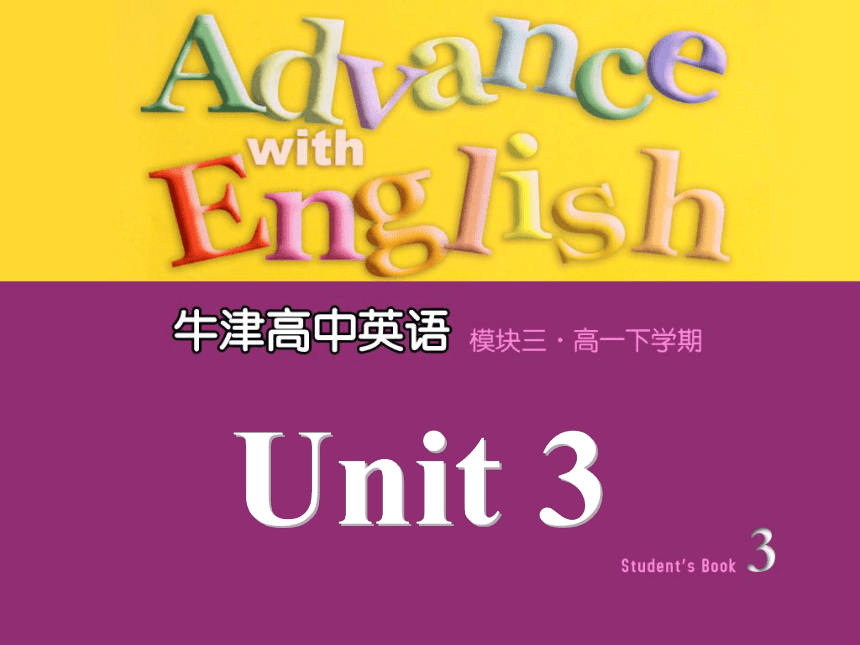 | |
| 格式 | zip | ||
| 文件大小 | 1.7MB | ||
| 资源类型 | 教案 | ||
| 版本资源 | 牛津译林版 | ||
| 科目 | 英语 | ||
| 更新时间 | 2020-01-09 22:27:27 | ||
图片预览

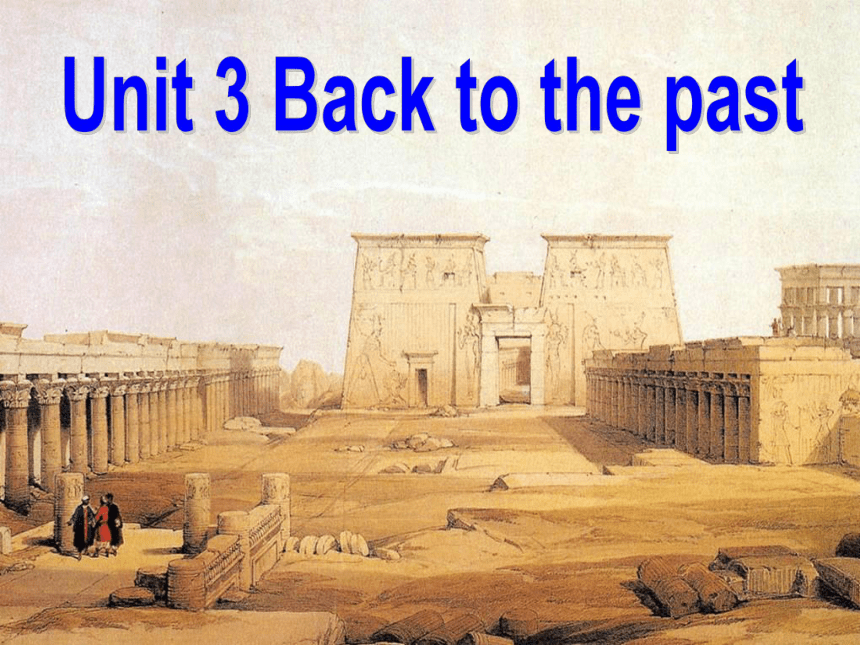
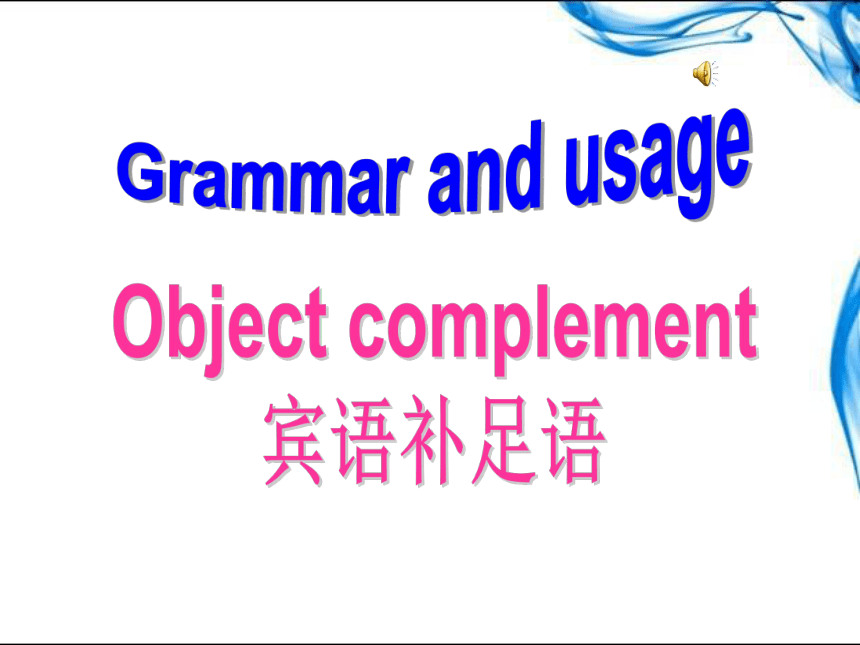
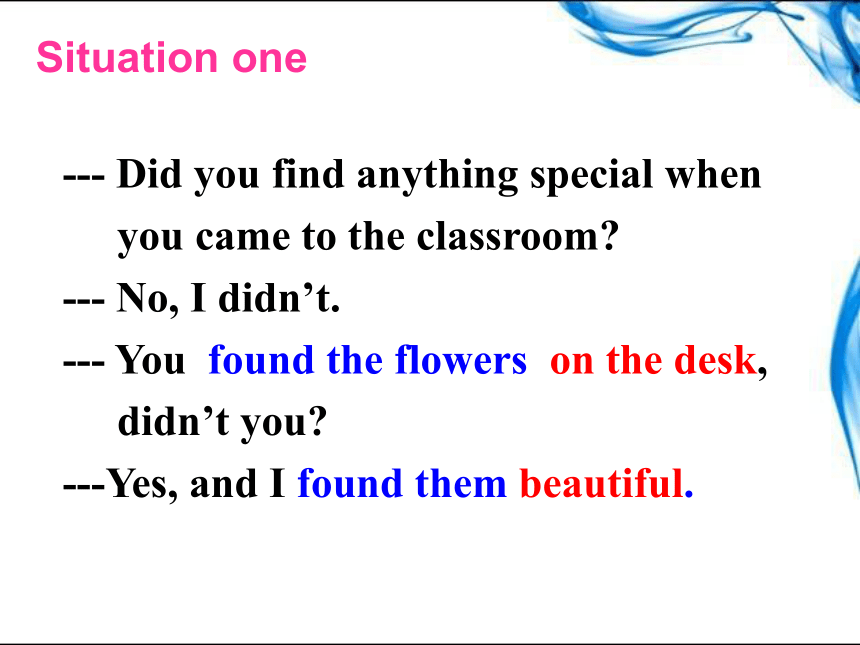
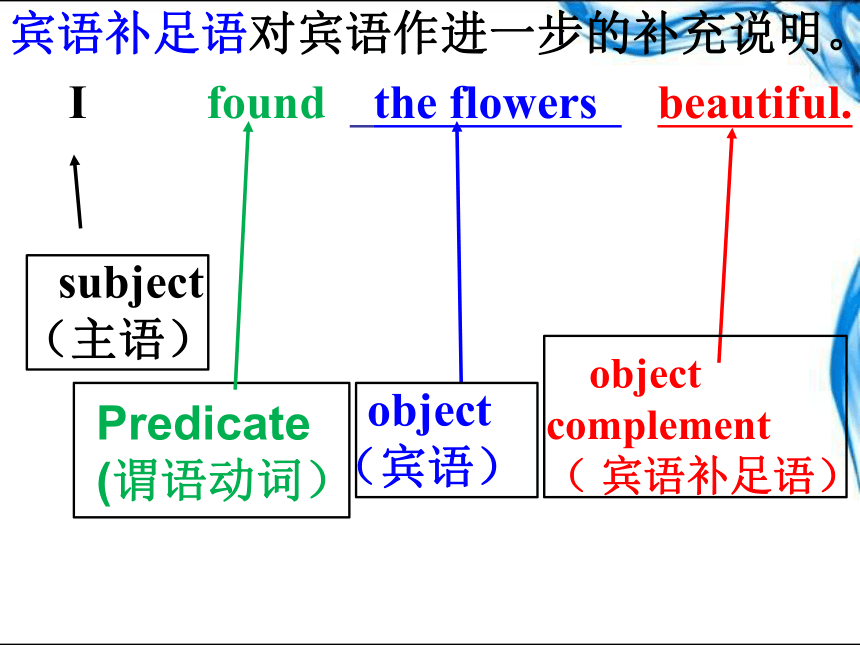
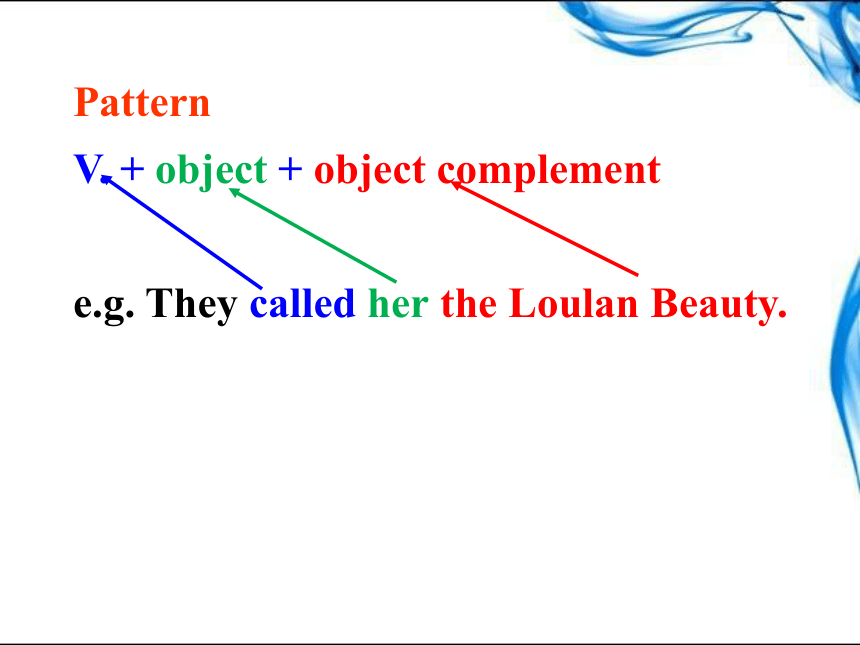
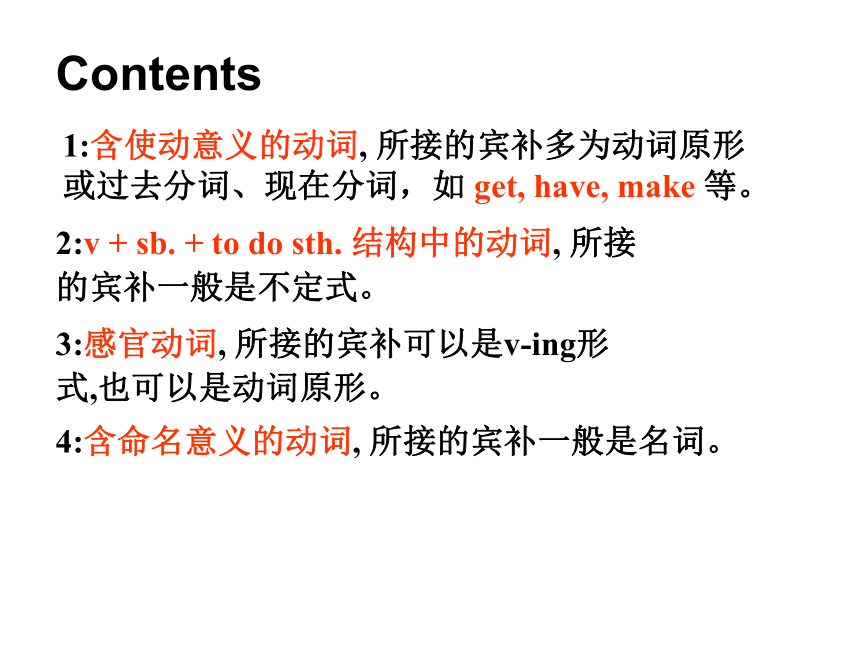


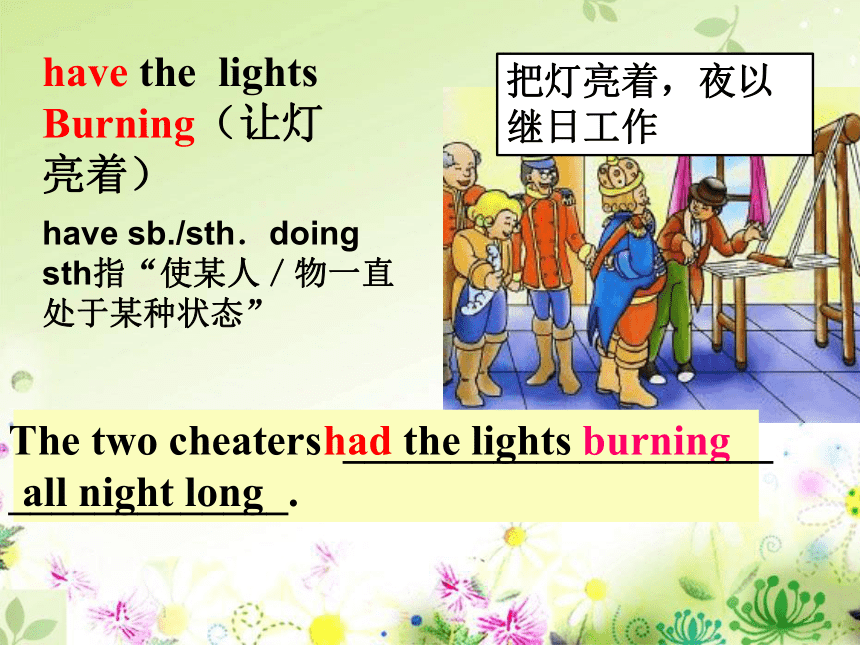
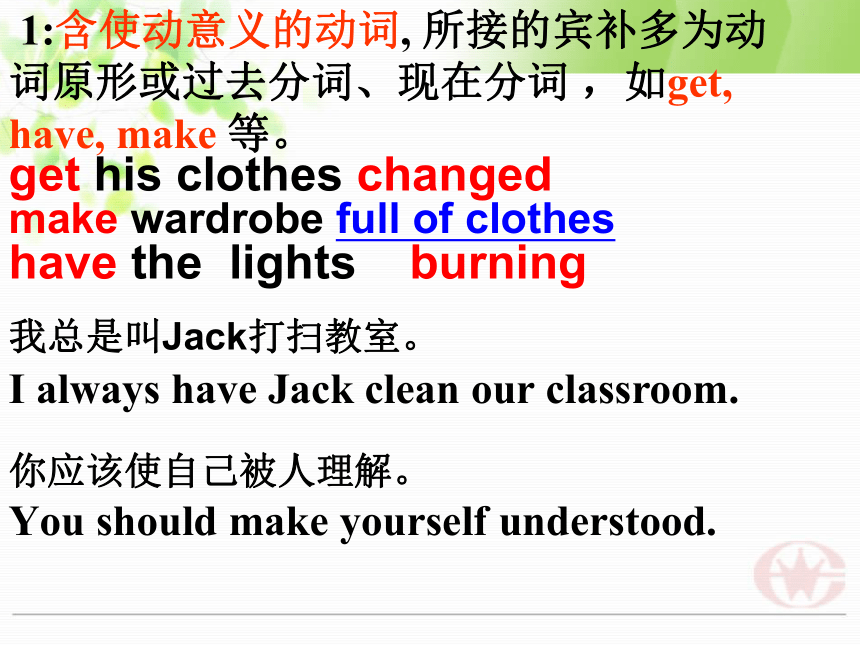
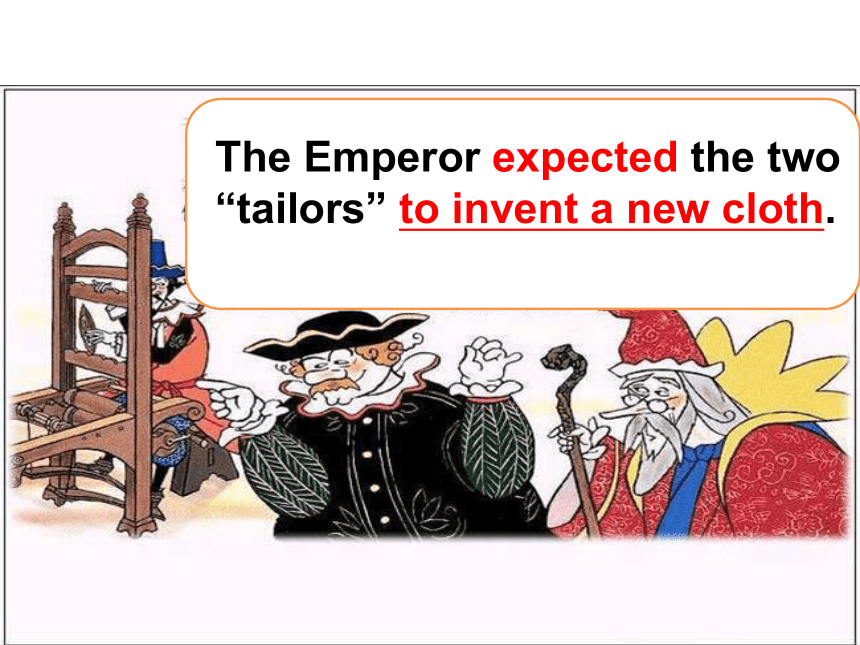
文档简介
课件69张PPT。Unit 3Unit 3 Back to the past Object complement
宾语补足语Grammar and usage--- Did you find anything special when you came to the classroom?
--- No, I didn’t.
--- You found the flowers on the desk, didn’t you?
---Yes, and I found them beautiful.Situation one 宾语补足语对宾语作进一步的补充说明。
I found the flowers beautiful.
object complement
( 宾语补足语) subject
(主语)Predicate
(谓语动词) object
(宾语)Pattern
V. + object + object complement
e.g. They called her the Loulan Beauty.Contents1:含使动意义的动词, 所接的宾补多为动词原形或过去分词、现在分词,如 get, have, make 等。2:v + sb. + to do sth. 结构中的动词, 所接的宾补一般是不定式。3:感官动词, 所接的宾补可以是v-ing形式,也可以是动词原形。4:含命名意义的动词, 所接的宾补一般是名词。He made wardrobe(衣柜) full of clothes .The Emperor And His New Clothes把衣柜装满衣服 got his clothes changed
every a few hours every dayThe Emperor ____________________
_____ _ __________________.get his clothes changed每几个小时换新衣服 had the lights burning all night longhave the lights
Burning(让灯亮着)The two cheaters ____________________
_____________.把灯亮着,夜以继日工作have sb./sth.doing sth指“使某人/物一直处于某种状态” 1:含使动意义的动词, 所接的宾补多为动词原形或过去分词、现在分词 ,如get, have, make 等。I always have Jack clean our classroom.You should make yourself understood.我总是叫Jack打扫教室。你应该使自己被人理解。make wardrobe full of clothes get his clothes changedhave the lights burningThe Emperor expected the two “tailors” to invent a new cloth. ordered the parade to begin
after he was dressed in his new clothesThe Emperor ________________________
_________________________________.order the parade
to begin命令游行开始2:v + sb. + to do sth. 结构中的动词, 所接的宾补一般是不定式。
advise, allow, ask, beg, cause, expect, force, get, help, inspire, invite, order, permit, persuade, request, require, tell, teach, train, urge, want, warn, wish等expected the two “tailors” to invent a new clothorder the parade to beginThey saw theEmperor walking
in the street .3:感官动词, 所接的宾补可以是v-ing形式,也可以是动词原形。
feel, hear, listen to, notice, observe, see, watch, look at1. I saw him ____________ (cross) the road.
注:He was seen _______________ (cross) the road.cross/crossingto cross但当这些词用于被动语态时,
不定式要带toa fool
with no clothes onPeople considered him
__________
_____________________!consider the Emperor
a fool 4:含命名意义的动词, 所接的宾补一般是名词。
call, name, appoint, elect, make, consider
请叫我Lisa.
Call me Lisa, please.
我们选举了Miya为我们班的班长。
We elected Miya monitor of our class.Complete the second half of Ann’s diary entry on Page 48.
Answers:
1. _________________ 2. _____________
3. _________________ 4. _____________
5. ________ 6. __________
7. ________to be a great scholara famous expertvery kind and patientreally hotcrazyin the hotelrecover------What do you think about Harry Potter?
------I find it ________________________.More practice with an object compliment:Very interesting从A、B、C、D四个选项中,选出可以填入空白处的最佳选项。
1. The teacher asked us ______ so much
noise.
A. don’t make B. not make
C. not making D. not to make2. After a knock at the door, the child
heard his mother’s voice _____ him.
A. calling B. called
C. being called D. to call3 .The missing boy was last seen ___
near the river.
A. playing B. to be playing
C. play D. to playD4. You can’t have the horse _____ all
the way. It’s too hot.
A. run B. to run
C. running D. to be runningC他告诉我要尽快完成作业。
我们看见学生们在操场上。
我们必须保持教室清洁。 He told me to finish my homework as soon as possible.We saw the students on the playground.We must keep our classroom clean. Translate the sentences.Summary1:含使动意义的动词, 所接的宾补多为动词原形或过去分词、现在分词,如 get, have, make 等。2:v + sb. + to do sth. 结构中的动词, 所接的宾补一般是不定式。3:感官动词, 所接的宾补可以是v-ing形式,也可以是动词原形。4:含命名意义的动词, 所接的宾补一般是名词。Either…or 不是…就是…
…或 …
要么..要么…
neither…nor 既不…也不…Either Ann or Jane gave me the vase as a birthday gift. People either tried to flee or stayed in their houses. 1、作主语:Ann或Jane 给了我一个花瓶作为生日礼物。2、作谓语动词:人们不是尝试逃离,就是呆在家里。We could choose to employ either John or Martin. They are going down the valley either today or tomorrow. 3、作宾语:我们可以选择雇佣John或Martin3、连接副词作状语:他们打算今天或明天下山。状语Neither the museum nor the library seems attractive to her.2 Neither…nor…表达否定 既不…也不…(反义词:Both …and…)It turned out that this material was neither silk nor cotton.博物馆和图书馆都对她没有吸引力。结果是,这一材料既不是丝绸,也不是棉布。Unlike my brother, I liked neither the sculpture nor the painting.The island can be accessed neither by train nor by air.不像我的哥哥,我既不喜欢雕刻,也不喜欢画画。这座岛屿,坐火车和坐飞机都不能进入。Read this conversation between two of the tour guides. Use either…or… and neither…nor… to rewrite the parts in yellow. The first one is done for you.We can go to the tomb today. We can also go to the tomb tomorrow. What do you think? Ben: We can go to the tomb either today or tomorrow.I prefer tomorrow. The students are all too tired today. One complained that the room was not clean and that it was not very comfortable either. Sam: One complained that the room was neither clean nor very comfortable.Well, I think the rooms are very clean and comfortable and I have slept very well in mine. Did you notice that Marco and Peter did not come to the talk? Ben: Did you notice that neither Marco nor Peter came to the talk? I suppose they were tired, but that’s not a very good excuse. Well, after visiting the ruins tomorrow, we can then relax. We can go to the East Mountain Restaurant. The West Lake Restaurant is also good. Sam: We can either go to the East Mountain Restaurant or the West Lake Restaurant._____ you or he the teacher of English?Neither my sister nor my mother _____
present at the meeting.Bwas由“either…or…, neither…nor…, or,
not…but…, not only… but also…”连接
两个并列主语时,动词与靠近的主语保
持一致。Not only I but Jane and Mary ______ tired of having one examination after another. A. is B. are C. am D. beB--- I have got one ticket for Liu Xiang’s 110m hurdle race to be held in Nanjing. _____ you __ your desk-mate can have it.
--- Is it on Saturday or on Sunday?
--- It is on next Monday.
--- Oh, what a pity. I am afraid ______ I ___ my desk-mate can enjoy it. Situation EitherneitherornorEither… or… and neither… nor…(1) Either … or…
can be used to express the idea of alternatives.
e.g. You can choose either A or B, which means you have two choices, you can choose any one of the two.
你可以从两个选项中选任何一个。 Situation
--- Which language can I use to write the speech? (in English/in Chinese)
--- You can write the speech either in English or in Chinese.(2) Neither … nor…
can be used to join two negative ideas together.
e.g. Neither A nor B is proper in this question, which means A is not proper, and B is not proper either.
这个问题的答案既不是A也不是B。Situation
--- Whose fault is it? (not yours/not mine)
--- It is neither your fault nor mine. It’s your friend Jack’s fault.Read the conversation between two of the tour guides on Page 49. Use either… or… and neither… nor… to rewrite the parts in yellow.Answers:
2. ________________________________
________________________________
3. ________________________________
________________________________
4. ________________________________
________________________________One complained that the room was
neither clean nor very comfortable.Did you notice that neither Marco nor
Peter came to the talk?We can either go to the East Mountain
Restaurant or the West Lake Restaurant. 在英语句子里,谓语受主语支配,
其动词必须和主语在人称和数上保持一
致,这就叫主谓一致。寻其规律,大致
可归纳为三个原则,即语法一致、意义
一致和就近一致原则。 Subject-verb agreement 语法一致原则:即句子主语是单数,
谓语动词;句子主语是复数,谓语动词
就用复数;
2. 意义一致原则:即谓语动词该用单数
还是复数取决于主语所表达的内容在含
义上是单数意义还是复数意义;
3. 就近一致原则:即谓语动词该用单数
还是复数形式,取决于最邻近它的主
语。1. The people’s republic of China ____ (be) founded in 1949.
2. The food they offered on the plane ___ (be) delicious.waswasFill in the blanks with the right verb forms:Note:
如果主语是单数名词或不可数名词,谓语动词用单数。3. Two hours __ (be) not enough for so much homework.
4. Twenty thousand dollars __ (be) a large amount of money to me.isisNote: 如果主语是一个表示计量,标题或名称的短语,谓语动词用单数。5. Collecting stamps _____ (be) one of his favourite pastimes.
6. That it keeps raining cats and dogs ________ (worry) the tourists. worriesisNote: 如果主语是个短语或从句,谓语动词要用单数。7. My friend and I _______ (want) to play
outside after watching TV.
8. ______ (have) your classmates finished
their homework?wantHaveNote: 如果主语是复数,谓语动词用复数。9. All of us ____________ ( attend) the
lecture about Pompeii.
10. Most of the lecture ___ (be) about
how the ancient city was discovered.
11. I spent only 30 yuan buying books
and the rest of money ___ (be) spent
on my food.have attendedwaswasNote:
如果主语是由 all of/ most of/ some of /half of/ a part of +noun/ pronoun 构成时,谓语动词单复数要与这个名词或代词保持一致。13. His family __ (be ) to move to the
countryside next month.
14. His family ___ all (be) fond of popular
music.
15. Our school __ (be) a key school in
Jiangsu Province.
16. Our school ___ doing (do) morning
exercises now on the playground.isareisareNote:
当主语是集体名词时,e.g. crowd/class/
dozen/family/public and team, 如果作为整体来讲,谓语动词要用单数;如果作为具体的每个成员讲,谓语动词用单数。17. The remains of the old castle _____
(be) destroyed in World War Ⅱ.
18. The news ___ (be) too good to be true.wereNote:
主语是 news/physics and mathematics等词时,谓语动词用单数; 主语是glasses/clothes/congratulations and remains等词时,谓语动词用复数。is19. Either the team leader or the guides
___ (be) looking after the students.
20. Neither noodles nor rice __ (be)
delicious today.
21. Either you or the headmaster ___ (be)
to hand out prizes to those gifted
students at the meeting.areiswas22. Not only you but also I ___ (be)
puzzled at her worried look.
Note:
neither…nor…/ either…or…/ not only…but also… and not… but… are 遵循就近原则。amLook at one more of Ann’s diary entries on Page 51. Circle the correct words.
Answers:
1. _____ 2. _____ 3. _____ 4. ______
5. _____ 6. _____ 7. _____ 8. ______
9. _________ 10. ________waswaswerewerewaswaswaswerewasn’tisRead the letter on Page 51. Put the verbs into their correct forms.
Answers:
1. _____ 2. _____ 3. _____ 4. ______
5. _____ 6. _________ 7. ________
8. ______ 9. _________ 10. _______isishavehavearehaveexploremattershaveare1. Each of you _______ responsible for the accident.
a. am b. be c. is d. are
2. Each man and woman ______ the same rights.
a. has b. have c. had d. is having3. Every means ____ tried but without much result.
a. has been b. have been
c. are d. is
4. There ______ in this room.
a. are too much furniture
b. is too many furnitures
c. are too much furnitures
d. is too much furniture5. The manager or his assistant ___ planning to go.
a. were b. are c. was d. be
6. Not only I but also David and Iris __ fond of playing basketball.
a. am b. is c. are d. was
7. Neither Tom nor his parents ___ at home.
a. is b. are c. has d. was8. Either the dean or the principal ___ the meeting.
a. attends b . Attend
c. are attending d. have attended
9. _____ was wrong.
a. Not the teacher but the students
b. Both the students and the teacher
c. Neither the teacher not the students
d. Not the students but the teacher10. --- “___ twenty dollars a big sum to her?”
--- “I suppose so.”
a. Will be b. Is
c. Are d. Were
11. Three hours ____ enough for us to finish the task.
a. are b. has c. is d. were12. Most of his savings ___ in the Xin Hua
Bank.
a. has been kept b. is being kept
c. have kept d. have been kept
13. All that can be done ______.
a. has done b. has been done
c. have done d. have been done14. One or perhaps more pages ______. a. is missing b. has been missed c. are missing d. was missing
15. More than one worker ____ dismissed.
a. have been b. are
c. has been d. has
宾语补足语Grammar and usage--- Did you find anything special when you came to the classroom?
--- No, I didn’t.
--- You found the flowers on the desk, didn’t you?
---Yes, and I found them beautiful.Situation one 宾语补足语对宾语作进一步的补充说明。
I found the flowers beautiful.
object complement
( 宾语补足语) subject
(主语)Predicate
(谓语动词) object
(宾语)Pattern
V. + object + object complement
e.g. They called her the Loulan Beauty.Contents1:含使动意义的动词, 所接的宾补多为动词原形或过去分词、现在分词,如 get, have, make 等。2:v + sb. + to do sth. 结构中的动词, 所接的宾补一般是不定式。3:感官动词, 所接的宾补可以是v-ing形式,也可以是动词原形。4:含命名意义的动词, 所接的宾补一般是名词。He made wardrobe(衣柜) full of clothes .The Emperor And His New Clothes把衣柜装满衣服 got his clothes changed
every a few hours every dayThe Emperor ____________________
_____ _ __________________.get his clothes changed每几个小时换新衣服 had the lights burning all night longhave the lights
Burning(让灯亮着)The two cheaters ____________________
_____________.把灯亮着,夜以继日工作have sb./sth.doing sth指“使某人/物一直处于某种状态” 1:含使动意义的动词, 所接的宾补多为动词原形或过去分词、现在分词 ,如get, have, make 等。I always have Jack clean our classroom.You should make yourself understood.我总是叫Jack打扫教室。你应该使自己被人理解。make wardrobe full of clothes get his clothes changedhave the lights burningThe Emperor expected the two “tailors” to invent a new cloth. ordered the parade to begin
after he was dressed in his new clothesThe Emperor ________________________
_________________________________.order the parade
to begin命令游行开始2:v + sb. + to do sth. 结构中的动词, 所接的宾补一般是不定式。
advise, allow, ask, beg, cause, expect, force, get, help, inspire, invite, order, permit, persuade, request, require, tell, teach, train, urge, want, warn, wish等expected the two “tailors” to invent a new clothorder the parade to beginThey saw theEmperor walking
in the street .3:感官动词, 所接的宾补可以是v-ing形式,也可以是动词原形。
feel, hear, listen to, notice, observe, see, watch, look at1. I saw him ____________ (cross) the road.
注:He was seen _______________ (cross) the road.cross/crossingto cross但当这些词用于被动语态时,
不定式要带toa fool
with no clothes onPeople considered him
__________
_____________________!consider the Emperor
a fool 4:含命名意义的动词, 所接的宾补一般是名词。
call, name, appoint, elect, make, consider
请叫我Lisa.
Call me Lisa, please.
我们选举了Miya为我们班的班长。
We elected Miya monitor of our class.Complete the second half of Ann’s diary entry on Page 48.
Answers:
1. _________________ 2. _____________
3. _________________ 4. _____________
5. ________ 6. __________
7. ________to be a great scholara famous expertvery kind and patientreally hotcrazyin the hotelrecover------What do you think about Harry Potter?
------I find it ________________________.More practice with an object compliment:Very interesting从A、B、C、D四个选项中,选出可以填入空白处的最佳选项。
1. The teacher asked us ______ so much
noise.
A. don’t make B. not make
C. not making D. not to make2. After a knock at the door, the child
heard his mother’s voice _____ him.
A. calling B. called
C. being called D. to call3 .The missing boy was last seen ___
near the river.
A. playing B. to be playing
C. play D. to playD4. You can’t have the horse _____ all
the way. It’s too hot.
A. run B. to run
C. running D. to be runningC他告诉我要尽快完成作业。
我们看见学生们在操场上。
我们必须保持教室清洁。 He told me to finish my homework as soon as possible.We saw the students on the playground.We must keep our classroom clean. Translate the sentences.Summary1:含使动意义的动词, 所接的宾补多为动词原形或过去分词、现在分词,如 get, have, make 等。2:v + sb. + to do sth. 结构中的动词, 所接的宾补一般是不定式。3:感官动词, 所接的宾补可以是v-ing形式,也可以是动词原形。4:含命名意义的动词, 所接的宾补一般是名词。Either…or 不是…就是…
…或 …
要么..要么…
neither…nor 既不…也不…Either Ann or Jane gave me the vase as a birthday gift. People either tried to flee or stayed in their houses. 1、作主语:Ann或Jane 给了我一个花瓶作为生日礼物。2、作谓语动词:人们不是尝试逃离,就是呆在家里。We could choose to employ either John or Martin. They are going down the valley either today or tomorrow. 3、作宾语:我们可以选择雇佣John或Martin3、连接副词作状语:他们打算今天或明天下山。状语Neither the museum nor the library seems attractive to her.2 Neither…nor…表达否定 既不…也不…(反义词:Both …and…)It turned out that this material was neither silk nor cotton.博物馆和图书馆都对她没有吸引力。结果是,这一材料既不是丝绸,也不是棉布。Unlike my brother, I liked neither the sculpture nor the painting.The island can be accessed neither by train nor by air.不像我的哥哥,我既不喜欢雕刻,也不喜欢画画。这座岛屿,坐火车和坐飞机都不能进入。Read this conversation between two of the tour guides. Use either…or… and neither…nor… to rewrite the parts in yellow. The first one is done for you.We can go to the tomb today. We can also go to the tomb tomorrow. What do you think? Ben: We can go to the tomb either today or tomorrow.I prefer tomorrow. The students are all too tired today. One complained that the room was not clean and that it was not very comfortable either. Sam: One complained that the room was neither clean nor very comfortable.Well, I think the rooms are very clean and comfortable and I have slept very well in mine. Did you notice that Marco and Peter did not come to the talk? Ben: Did you notice that neither Marco nor Peter came to the talk? I suppose they were tired, but that’s not a very good excuse. Well, after visiting the ruins tomorrow, we can then relax. We can go to the East Mountain Restaurant. The West Lake Restaurant is also good. Sam: We can either go to the East Mountain Restaurant or the West Lake Restaurant._____ you or he the teacher of English?Neither my sister nor my mother _____
present at the meeting.Bwas由“either…or…, neither…nor…, or,
not…but…, not only… but also…”连接
两个并列主语时,动词与靠近的主语保
持一致。Not only I but Jane and Mary ______ tired of having one examination after another. A. is B. are C. am D. beB--- I have got one ticket for Liu Xiang’s 110m hurdle race to be held in Nanjing. _____ you __ your desk-mate can have it.
--- Is it on Saturday or on Sunday?
--- It is on next Monday.
--- Oh, what a pity. I am afraid ______ I ___ my desk-mate can enjoy it. Situation EitherneitherornorEither… or… and neither… nor…(1) Either … or…
can be used to express the idea of alternatives.
e.g. You can choose either A or B, which means you have two choices, you can choose any one of the two.
你可以从两个选项中选任何一个。 Situation
--- Which language can I use to write the speech? (in English/in Chinese)
--- You can write the speech either in English or in Chinese.(2) Neither … nor…
can be used to join two negative ideas together.
e.g. Neither A nor B is proper in this question, which means A is not proper, and B is not proper either.
这个问题的答案既不是A也不是B。Situation
--- Whose fault is it? (not yours/not mine)
--- It is neither your fault nor mine. It’s your friend Jack’s fault.Read the conversation between two of the tour guides on Page 49. Use either… or… and neither… nor… to rewrite the parts in yellow.Answers:
2. ________________________________
________________________________
3. ________________________________
________________________________
4. ________________________________
________________________________One complained that the room was
neither clean nor very comfortable.Did you notice that neither Marco nor
Peter came to the talk?We can either go to the East Mountain
Restaurant or the West Lake Restaurant. 在英语句子里,谓语受主语支配,
其动词必须和主语在人称和数上保持一
致,这就叫主谓一致。寻其规律,大致
可归纳为三个原则,即语法一致、意义
一致和就近一致原则。 Subject-verb agreement 语法一致原则:即句子主语是单数,
谓语动词;句子主语是复数,谓语动词
就用复数;
2. 意义一致原则:即谓语动词该用单数
还是复数取决于主语所表达的内容在含
义上是单数意义还是复数意义;
3. 就近一致原则:即谓语动词该用单数
还是复数形式,取决于最邻近它的主
语。1. The people’s republic of China ____ (be) founded in 1949.
2. The food they offered on the plane ___ (be) delicious.waswasFill in the blanks with the right verb forms:Note:
如果主语是单数名词或不可数名词,谓语动词用单数。3. Two hours __ (be) not enough for so much homework.
4. Twenty thousand dollars __ (be) a large amount of money to me.isisNote: 如果主语是一个表示计量,标题或名称的短语,谓语动词用单数。5. Collecting stamps _____ (be) one of his favourite pastimes.
6. That it keeps raining cats and dogs ________ (worry) the tourists. worriesisNote: 如果主语是个短语或从句,谓语动词要用单数。7. My friend and I _______ (want) to play
outside after watching TV.
8. ______ (have) your classmates finished
their homework?wantHaveNote: 如果主语是复数,谓语动词用复数。9. All of us ____________ ( attend) the
lecture about Pompeii.
10. Most of the lecture ___ (be) about
how the ancient city was discovered.
11. I spent only 30 yuan buying books
and the rest of money ___ (be) spent
on my food.have attendedwaswasNote:
如果主语是由 all of/ most of/ some of /half of/ a part of +noun/ pronoun 构成时,谓语动词单复数要与这个名词或代词保持一致。13. His family __ (be ) to move to the
countryside next month.
14. His family ___ all (be) fond of popular
music.
15. Our school __ (be) a key school in
Jiangsu Province.
16. Our school ___ doing (do) morning
exercises now on the playground.isareisareNote:
当主语是集体名词时,e.g. crowd/class/
dozen/family/public and team, 如果作为整体来讲,谓语动词要用单数;如果作为具体的每个成员讲,谓语动词用单数。17. The remains of the old castle _____
(be) destroyed in World War Ⅱ.
18. The news ___ (be) too good to be true.wereNote:
主语是 news/physics and mathematics等词时,谓语动词用单数; 主语是glasses/clothes/congratulations and remains等词时,谓语动词用复数。is19. Either the team leader or the guides
___ (be) looking after the students.
20. Neither noodles nor rice __ (be)
delicious today.
21. Either you or the headmaster ___ (be)
to hand out prizes to those gifted
students at the meeting.areiswas22. Not only you but also I ___ (be)
puzzled at her worried look.
Note:
neither…nor…/ either…or…/ not only…but also… and not… but… are 遵循就近原则。amLook at one more of Ann’s diary entries on Page 51. Circle the correct words.
Answers:
1. _____ 2. _____ 3. _____ 4. ______
5. _____ 6. _____ 7. _____ 8. ______
9. _________ 10. ________waswaswerewerewaswaswaswerewasn’tisRead the letter on Page 51. Put the verbs into their correct forms.
Answers:
1. _____ 2. _____ 3. _____ 4. ______
5. _____ 6. _________ 7. ________
8. ______ 9. _________ 10. _______isishavehavearehaveexploremattershaveare1. Each of you _______ responsible for the accident.
a. am b. be c. is d. are
2. Each man and woman ______ the same rights.
a. has b. have c. had d. is having3. Every means ____ tried but without much result.
a. has been b. have been
c. are d. is
4. There ______ in this room.
a. are too much furniture
b. is too many furnitures
c. are too much furnitures
d. is too much furniture5. The manager or his assistant ___ planning to go.
a. were b. are c. was d. be
6. Not only I but also David and Iris __ fond of playing basketball.
a. am b. is c. are d. was
7. Neither Tom nor his parents ___ at home.
a. is b. are c. has d. was8. Either the dean or the principal ___ the meeting.
a. attends b . Attend
c. are attending d. have attended
9. _____ was wrong.
a. Not the teacher but the students
b. Both the students and the teacher
c. Neither the teacher not the students
d. Not the students but the teacher10. --- “___ twenty dollars a big sum to her?”
--- “I suppose so.”
a. Will be b. Is
c. Are d. Were
11. Three hours ____ enough for us to finish the task.
a. are b. has c. is d. were12. Most of his savings ___ in the Xin Hua
Bank.
a. has been kept b. is being kept
c. have kept d. have been kept
13. All that can be done ______.
a. has done b. has been done
c. have done d. have been done14. One or perhaps more pages ______. a. is missing b. has been missed c. are missing d. was missing
15. More than one worker ____ dismissed.
a. have been b. are
c. has been d. has
